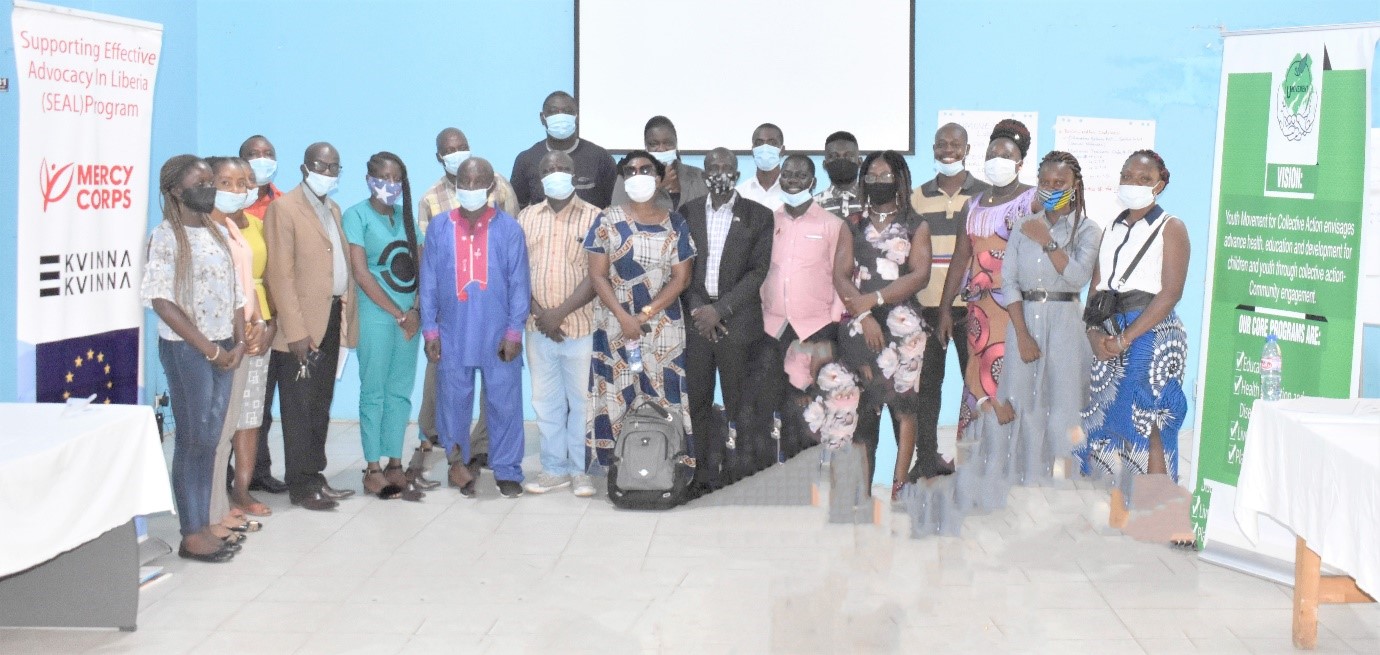PHOTO: Stakeholder that met for the event in Monrovia
Youth Movement for Collective Action (UMOVEMENT-Liberia) has conducted a day-long Desk Review of major policy documents that protect vulnerable girls and young women from school related sexual and gender-based violence in Monrovia.
Policy documents reviewed on Monday February 15, 2021 included the National Policy on Girls’ Education, the Education Reform Action of 2011 and the Teacher Code of Conduct.
“Today’s session aims to help transform the way the education system functions so that all girls and boys can benefit and reach their full potential, and that women participate fully and equally in educational administration, policy formulation and decision-making,” said Caroline L. Vah-Lord, UMOVEMENT-Liberia Education Officer during her opening remarks.
According to a press-release, the Desk Review is part of series of activities under the organization’s six month public policy advocacy titled: Girls’ Access to Education Information and Services (GAEINS) project supported by Mercy Corps through the Supporting Effective Advocacy in Liberia (SEAL) program.
The one-day gathering was intended to gather stakeholders’ perspective on how information contains in Liberia’s education public policies about girls’ education and how available services for them can reach across communities to empower women and girls to combat abuses in school and access available services in the wake of the Corona virus (COVID-19) pandemic in Montserrado County.
Stakeholders at the Desk Review included District Education Officers (DEOs), the Women and Children Protection Section of the Liberia National Police (LNP-WACPS), civil society actors, County Education Officer (CEO), the media, among others.
According to Madam Lord, public policy documents and information that protect girls from harm at institutions of learning are still largely available only to the crafters such as the Ministry of Education and partners without reaching to all stakeholders in the sector as should be in the case.
She urged school authorities to ensure that girls access information and available services that protect them from school related sexual and gender-based violence while in school, especially those that are based on sex for grade and sexual harassment which she said traumatizes girls and hinder their development.
Also speaking, Mercy Corps Quality Assurance Manager Hellen Harris lauded UMOVEMENT-Liberia for organizing the event, stating that it demonstrates civil society capacity to engage in constructive advocacy based on facts.
“This is what we call effective advocacy for us at the level of Mercy Corps because this forum provides the opportunity for frank exchange of views on what the real policy issues are and what government and her civil society counterpart can do together to overcome policy implementation gaps,” she said.
She reassured the organization of Mercy Corps commitment to ensuring that civil societal organizations gain the capacity needed to advocate effectively, adding that the event has brought policy documents on girls’ education to the spotlight for action as an important step to “moving policies from being shelf documents to implementation.”
For her part, the Executive Director of the Women and Children In Action for Development, (WOCHIAD) Roberta S. Freeman outline some of the issues affecting girls’ education in the country.
“We are having problems with many girls getting pregnant while in school and yet much is not being done to address this issue. It will interest you to know that on the list of the people who perpetrate violence including impregnating girls are teachers, who are under moral and legal obligation to protect them as well as classmates who pose as help to tutor them to pass subjects difficult subject such as mathematics, physics and biology outside of ‘teachers’ help,” she said.
Founded in 2011, Youth Movement for Collective Action (UMOVEMENT-Liberia), is a registered non-governmental, non-political and non-for-profit organization, which strongly believe that a good education is the key to breaking the cycle of poverty and can create a better future for children and their families.

